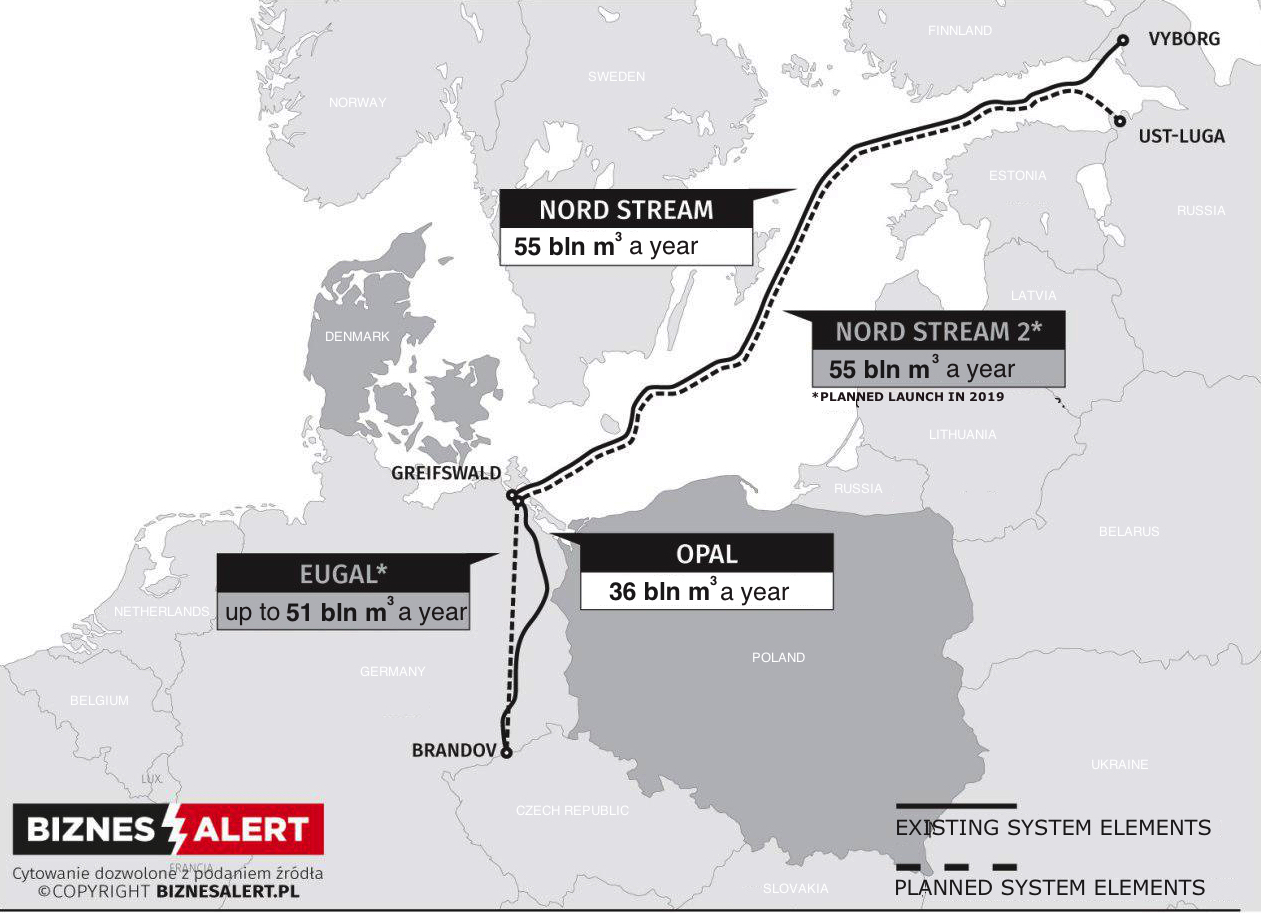The French opinion portal Opinion Internationale has published an extensive analysis on Gazprom restricting gas supply to Europe to force the launch of Nord Stream 2. The piece sheds new light on the dispute over the gas price crisis. Did Russia’s partners in Germany know about it in advance?
The December gas deliveries on the TTF exchange cost more than USD 1,000 per 1,000 cubic meters. That’s almost two times less than the November 2021 record, but still almost five times more than the 2020 average of about USD 200.
Gazprom argues that it cannot increase gas supply to Europe. However, according to Opinion Internationale, a French opinion portal associated with political movements fighting Marine Le Pen’s National Front, this is not true. While gas supplies in 2021 fell by 48 percent through the Yamal pipeline and by 45 percent through the Druzhba pipeline, the deliveries to Turkey doubled. President Vladimir Putin said that Gazprom could increase supplies to Europe by 10 percent, but only under the condition that the contentious Nord Stream 2 pipeline will be certified. This process had been recently put on hold by Germany. The existing transmission capacity allows Gazprom to send up to 270 billion cubic meters to Europe a year. Therefore, the overcapacity is now at around 40 percent a year, due to demand in Europe persisting at around 200 billion cubic meters, not counting the pandemic year, when it dropped to 150 billion.
Opinion Internationale also reminds that Gazprom did not ensure the volume on the spot market, and limited the availability of gas to 50 percent on the SPIMEX exchange. Deliveries to Europe outside long-term contracts fell between March and mid-2021 by 53 percent. Another decline occurred in September and reached about 35 percent. All gas production in Russia is directed to gas storage facilities there, potentially giving the Russians full control over the supply of gas to Europe in the winter. In addition, Gazprom has not announced an auction for supplies in 2022 and bets on sales on the basis of futures contracts. It reserved 90 percent less capacity on the Yamal gas pipeline (Belarus and Poland) for next year, and 55 percent less capacity on the Bratstvo gas pipeline (Ukraine and Slovakia), in comparison to the period up to December 2020.
Gazprom’s actions resulted in a 7.5-fold increase in gas prices on the spot market. The scale of the increases year on year is higher than during the fuel crises of the 1970s, when prices rose 3.7 times in 1973/1974 and 2.8 times in 1978/1979. Opinion Internationale argues that this constitutes a breach of a dominant position in the market according to the European law and Article 102 of the Treaty on the Functioning of the European Union and the Competition and Consumer Protection Directive. The quoted portal also rejects the thesis that the price has increased due to the decline in LNG supplies to Europe. Deliveries of liquefied gas in January-June 2021 were significantly higher than the average in the previous years, between March and April 2021 they were almost twice as high.
„History reveals that Gazprom’s activities on the European Union market are part of a larger strategy. It involves creating bottlenecks, cornering customers and then presenting them with a solution to the problem in the form of regulatory privilege, which ultimately results in cementing the dominant position of this gas giant,” writes Nikola Patras from Opinion Internationale. The journalist also recalls that this strategy was used in 2009-2014 in disputes with customers in the Commonwealth of Independent States, and in 2014-2019 in relations with Ukraine’s Naftogaz. „In both cases, the market has been fragmented and competing offers have disappeared, allowing Gazprom, which is the source of the problem, to present itself as a guarantor of the stability of supplies,” the article explains.
The author recalls that the crisis after the Revolution of Dignity in Ukraine largely concerned the prices of gas supplies to this country, and the level of supplies through its territory to the European Union. „Cutting off gas supplies to Ukraine, and then the refusal of Russia to implement the ruling of the Court of Arbitration (in a dispute with Naftogaz – ed.) sealed the deal, leading to the first armed conflict on European soil since the wars in the former Yugoslavia,” Patras demonstrates.
According to the author, the German BASF, which is the financial partner of the Nord Stream 2 project, may have known in advance about the upcoming gas price crisis caused by the Russians. The company may have known this at least since June 2021, when it had decided to make additional purchases and provide gas reserves to the complexes in Ludwigshafen and Schwarzheide. „As a result, BASF was able to minimise potential losses and was not forced to purchase gas at the current market price, which has increased significantly. In this context, it is necessary to assume that the Russian giant has informed its partners in Germany it would lower gas deliveries. Thus, the national champions on the Rhine, such as E.on and VNG are on the suspect list,” Patras writes. BASF was thus able to ensure the security of gas supplies to the world’s largest chemical complex Ludwigshafen Verbund (near Frankfurt am Mein ), which employs nearly 40,000 people, as well as a CHP plant in Schwarzheide (near Dresden) and a chemical centre there, which provides, among others, materials for e-cars batteries. This complex employs 2,000 people.
Opinion Internationale recalls that Gazprom is the only company operating in Europe that has not replenished its gas reserves before the winter in the storage facilities under its control. They are now full at 18 percent, the lowest level in eight years.
Germany’s storage capacity is 23.8 bcm. The facilities in Rehden and Jemgum are controlled by a company called Astora, owned by Gazprom Germania. They hold about 6 bcm of gas reserves, which is a quarter of all of Germany’s gas stockpile.
Opinion Internationale/Wojciech Jakóbik









